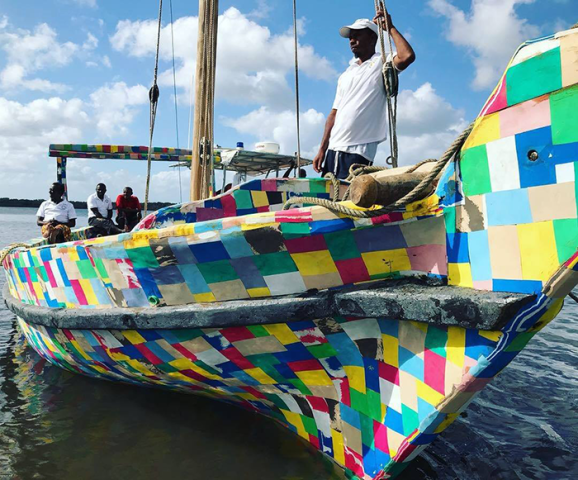Flipflopi: a 100% recycled boat celebrating the fight against plastic waste

In January 2018, we devoted an article to the Flipflopi expedition and its eponymous sailing boat, a dhow (a traditional boat from the Indian Ocean characterised by its trapezoidal sail). Its particularity: it was made entirely from the plastic waste littering the beaches of Kenya's east coast, using ancestral construction techniques.
With its hull entirely covered with 30,000 used multicoloured flip-flops, the one-of-a-kind, 9-metre sailboat was about to embark on its first expedition with a very specific aim: to raise awareness of good waste management practices and promote recycling initiatives.
Raising awareness about environmental protection
Some time has passed since that first successful awareness-raising action. The Flipflopi project has expanded and the community has grown. Its founders, Ben Morison, Dipesh Pabari and Ali Skanda, are more committed than ever to pursuing their initiative. They have joined the United Nations Environment Programme's Clean Oceans Campaign and are now supported by various partners, including the national governments of Kenya, Uganda and Tanzania; UNEP; the UK Foreign, Commonwealth & Development Office; the French Development Agency; the European Union; and more.
For their new 2021 campaign, a new—and just as colourful—10-metre Flipflopi has set sail for an expedition around Lake Victoria, the largest freshwater ecosystem in Africa but also the most polluted in the world.
Creating a circular economy through innovative and alternative solutions
The boat, which is made from 10 tonnes of plastic waste, made 21 stops in the three countries that border the lake—Kenya, Uganda and Tanzania—and travelled 995km. The crew met with local people, schoolchildren, business leaders and local authorities to advocate for alternative and innovative solutions to reduce plastic waste and promote the circular economy in Africa through education programmes, innovation centres for plastic recycling and waste management. The sailboat is a floating reminder that plastic waste can be re-used and given a second life. For Ben Morison, the Flipflopi project "has always been about encouraging change in a positive way, sharing the very simple message that single-use plastic really doesn't make sense". “If plastic can make a boat, it is too precious to be used only once," he added.
Giving visibility to local and positive initiatives
The expedition also aims to give visibility to dozens of local initiatives aimed at collecting, recycling or re-using plastic waste through videos that are widely distributed on social networks. An effective way "to highlight these key stakeholders of change, these people who work every day to save this lake and devise concrete and local solutions to fight pollution".
More information:
https://www.theflipflopi.com





